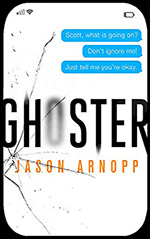
![]() SpaceAndSorcery
SpaceAndSorcery
12/6/2019
![]()
The synopsis for Ghoster promised an interesting mix between horror and social media technology, so that it was too appealing a premise to let such a story slide by: it's impossible not to notice how many people are absorbed, compulsively so, by their phones' screens - on public transport, on sidewalks, even in restaurants where interaction with other tablemates has been replaced by fixed stares at those screens - and I was curious to see how the horror element would dovetail with this widespread phenomenon.
Kate Collins is a senior paramedic and she's addicted to social media - or rather was: after her manic absorption caused her work partner some grievous damage, she decided that the best cure for her obsession would be to revert back to a basic model of phone, one where actual calls and text messaging are the only way to connect with the rest of the world. While participating in a "techno detox" retreat, Kate meets Scott Palmer, who quickly turns out to be the man of her dreams: after less than three months, Scott asks her to move in with him, and Kate leaves her job and life in Leeds behind to relocate with Scott in Brighton. When the day for the big move comes, however, Kate discovers that Scott's flat is completely empty, the man does not answer her increasingly frantic messages and the only thing he left behind is his smartphone.
Needing to know what happened, Kate finds the way to unlock Scott's phone and discovers the man seems to have built their relationship - such as it was - on a mountain of lies and things left unsaid: the Scott that comes out of his phone bears little resemblance to the one Kate fell in love with, and what's worse, the empty apartment, where power has been disconnected, is haunted by ghostly presences that leave mysterious and disturbing scratches on the inner surface of the front door. Kate's downward spiral, compounded by the return of her addiction to social media, is unstoppable and each new discovery drags her deeper and deeper into what looks like a descent into madness.
Ghoster turned out to be a book whose two components - the story and the characterization - seem to be at odds with each other: while the first works well, because the need to understand what really happened remains a constant drive, the latter did not work well for me, mainly because I could not connect with Kate and found her increasingly vexing if not downright stupid. At some point we learn that Kate has been working as a paramedic for fifteen years, so postulating that she started as early as eighteen, she must be thirty-three years old at least: however, the person we get to know in the book thinks and acts more like a thirteen year old - and I'm certain there are far more mature and responsible thirteen year olds in the world than this woman.
Kate is selfish and self-absorbed, an adult displaying all the worst traits to be found in those paint-by-the-numbers teenage characters giving YA fiction its bad reputation. Constantly complaining about the unfairness of life in general, she often looks prone to lay the blame on others, and when she admits her own failings she does so in a superficial, semi-serious way that belies the earnestness of the acknowledgment. This frivolous approach represents one of my main contentions with Kate as a character: even in the most grim of situations, she always resorts to some pun, or pop-culture reference that has no place in that context and often made me wonder about the real "mood" the author wanted to impart to the story. If Kate Collins was to be the embodiment of addiction to technology (or addiction at large), she does indeed display many of the symptoms - as denial of the problem, distance from the people wanting to help her, out-of-proportion reactions when faced with the naked truth - but in the end that offhand attitude, the false self-deprecatory jokes, spoil the desired effect and turn Kate into a caricature rather than a character we can believe in or relate to.
On the other hand, the story itself fares much better, because there is such a weirdly terrifying escalation in the discoveries Kate makes through the contents of Scott's phone - not only the fact that he's not the man she believed him to be, or that he seemed to entertain other relationships while they were dating and getting more serious, but the disturbing pictures and videos stored on the device. And of course there are the ghosts appearing in the empty flat, which are frightening on their own and even more so when Kate finds their living pictures in the phone's memory bank, or the weird scratches on the front door, or the definite sensation of being watched. The build-up, through false leads and shocking discoveries, takes us toward a surprise revelation that is unexpected and at the same time makes a chilling sort of sense, the kind of scenario whose deepest horror lies in its surface appearance of normality.
Sadly, the reveal takes what feels like a long time to get there - what with having to wade through the quagmire of Kate's constant whining, foolish antics and outlandish theories - and when it happens, its intended impact has been dulled by this improbable heroine and her preposterous behavior. Once I reached that final chapter I had the definite impression that the novel's core concept might have started its life as a short story - a compact, imaginative, delightfully scary story on the dangers of technology addiction - and that it was later padded, quite unnecessarily in my opinion, with Kate Collins' journey of discovery. Which on hindsight looks somewhat wasteful...
http://spaceandsorcery.wordpress.com